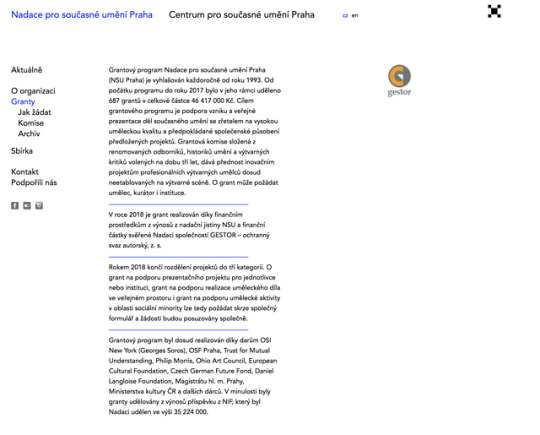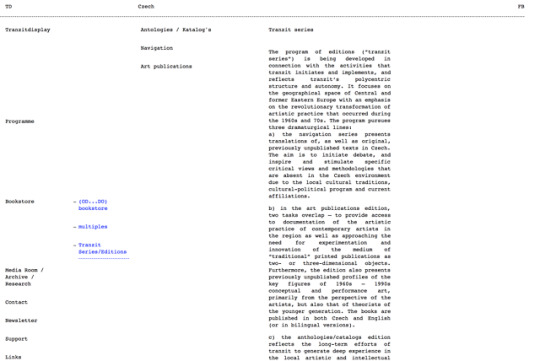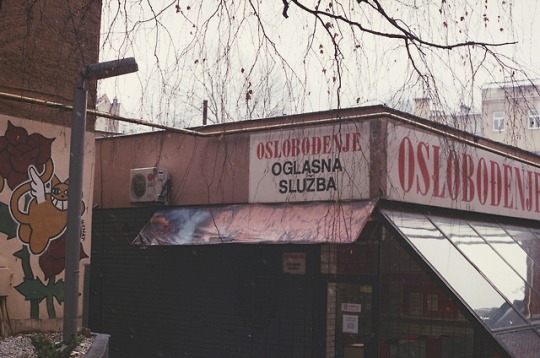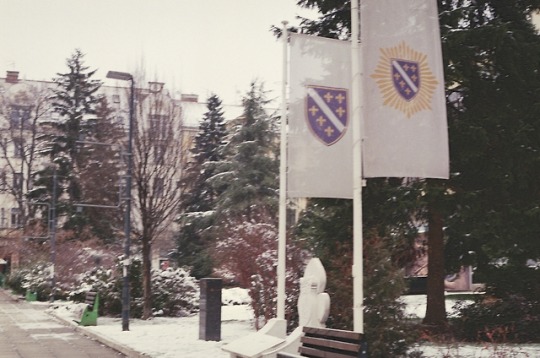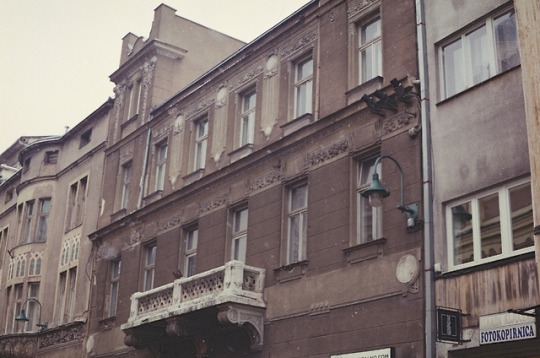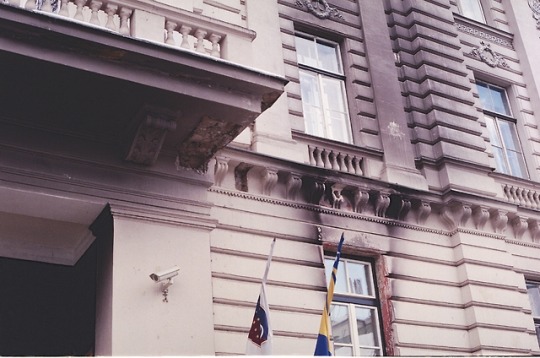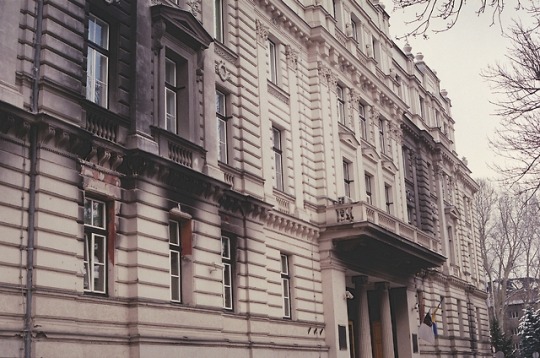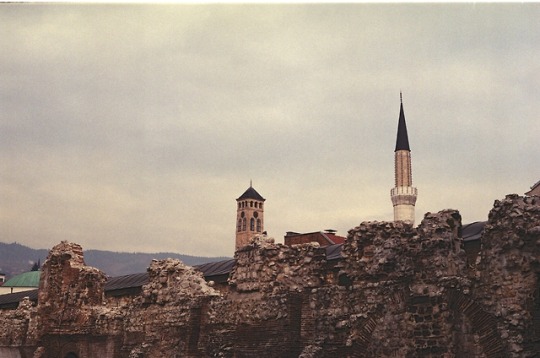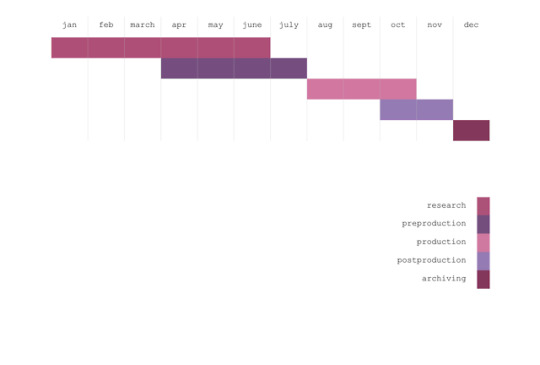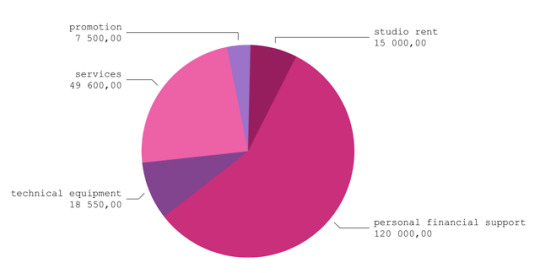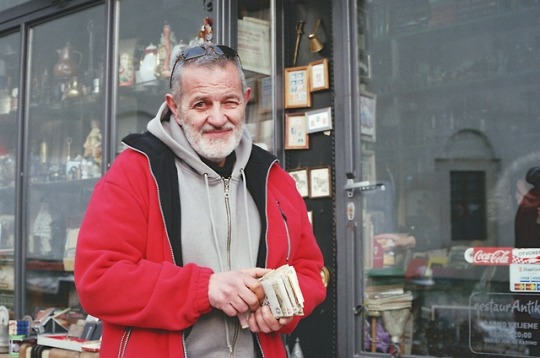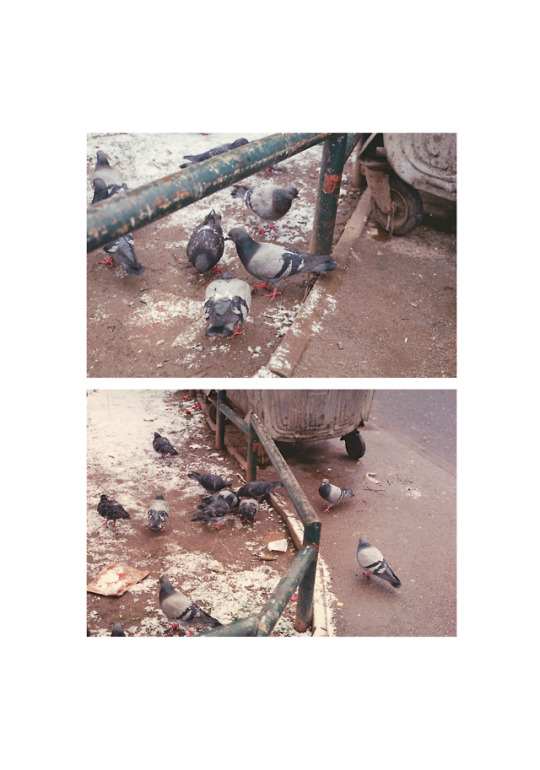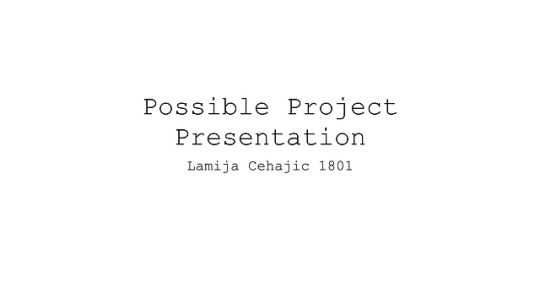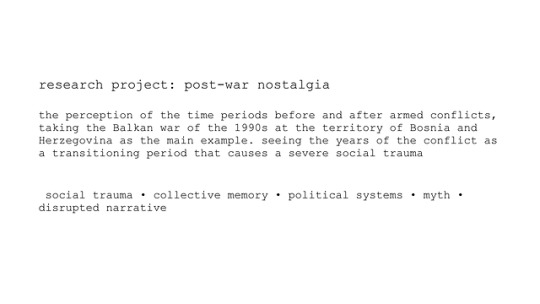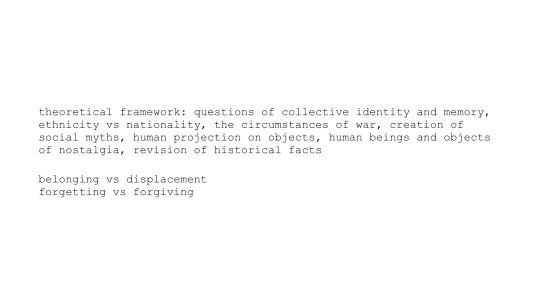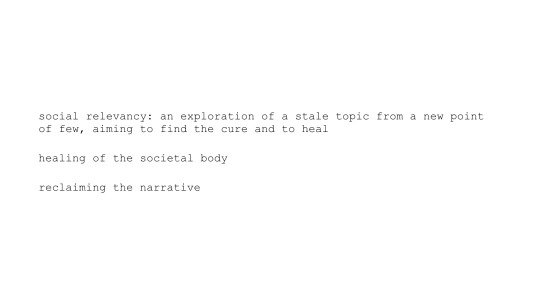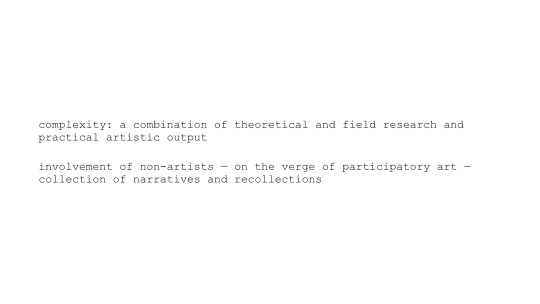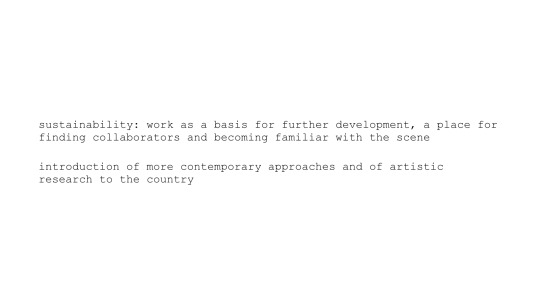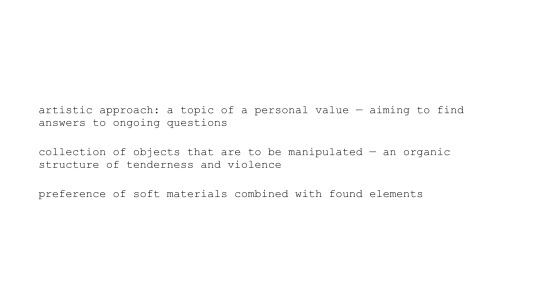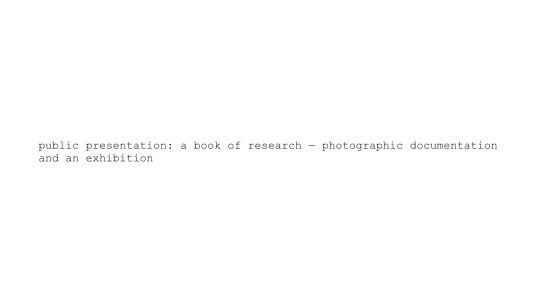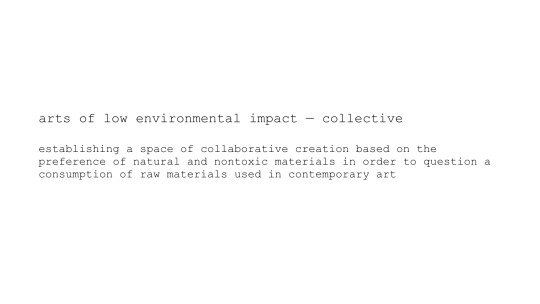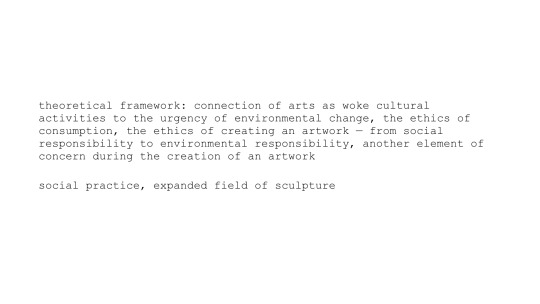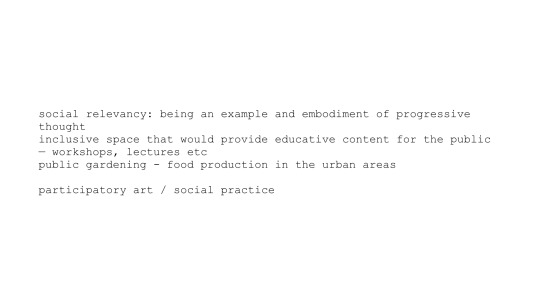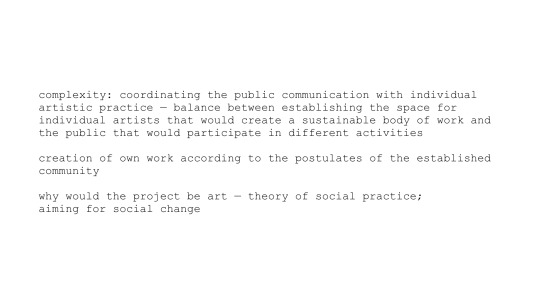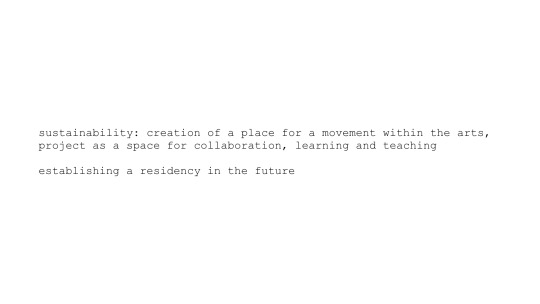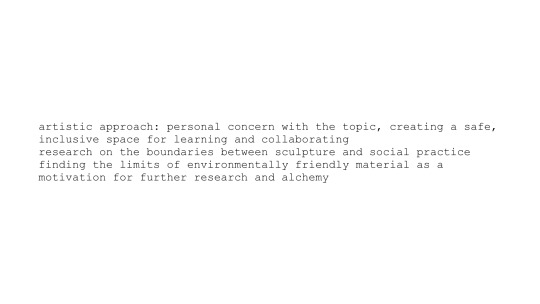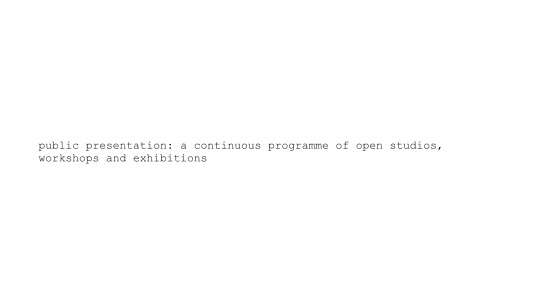Text
Memory Studies Handbook
notes
an international and interdisciplinary handbook
Astrid Erll
*memory studies - 20th century, Maurice Halbwachs, mémoire collective
*culture vs memory - cultural memory / providing a theoretical backbone, interdisciplinary and international
INTRODUCTION
*cultural memory since cca 1980s - margin together various disciplines of humanities / history, sociology, psychology, anthropology, arts, literature, media, neurosciences etc.
*how art emerges in the field of memory?
*cultural | social | collective // myth, monument, ritual, historiography vs knowledge
*Maurice Halbwachs (1925) / individual vs collective; memory as a dialogue between different disciplines (ex. myth vs psychology); “interplay of socio-cultural contexts” / individual - family - nationality - transnational level
*narratives vs construction of identity
*cultural remembering / narrational vs non narrational memory
*mémoire collective - cultural memory / Halbwachs vs cultural memory - memory + social context
*difference between “culture” as a term — Kulturwissenshaft vs anthropology / products of culture vs community’s specific way of life
*culture as 3d — social, material, mental
*cultural memory = social and material / medial + cognitive / mental
*meaning contained in reappearing symbols - cognitive + pattern of symbols - social and material
*biologically inheritable memory; symbolically constructed shared past
*memory presented in the media - actualised individuality — giving meaning to representations
*John Locke - identity constantly reconstructed via memory - past self in relation to the present self
*trauma - individual vs materialisation of trauma
*Halbwachs - history as dead, abstract, totalising vs memory as living, particular and meaningful
*modes of remembering - past being reconstructed
how is it remembered ?
*Halbwachs - “social frameworks of memory” shaping individual memory
lieux de mémoire - topography, planes of memory
*Aby Worburg — mediality of memory; pathos formulae — symbols with emotional intensity on the level of material objects
*intergenerational transmission of memory - media of memory / trauma and witnessing / Holocaust, gender, post-colonialism
*transitional justice
*places of memory - actual sites + media representation, ritual, belief
*cultural vs communicative; canon vs archive
I LIEUX DE MÉMOIRE
Pim den Boer
*loci memoriae - Cicero 1st cent bc — the myth of Simonides and mnemonic technique
*localisation of memory - planes
*orderly arrangement - images combined with loci — effective and memorable
*natural vs artificial memory — naturally embedded through thought vs system of training
*Pierre Nera - Lieux mémoire and national identity — places as ideological, never neutral — set by the state / memorials, monuments, museums etc
*national vs transnational (ex. Newton’s apple, theory of relativity etc)
2. Mario Isnenghi
*luoghi dalla memoria — past vs present, unification vs division
*seeking “us” — context of italy’s adopting and then repressing the memory of fascism
3. Jacques le Rider
*Central Europe as a lieu de mémoire; 20th cent happenings; nationalism and imperialism; intersection of north and south, “occident and orient”
*term “homo balkanicus” - primitivism, lack of cultural development (lol)
*Prague spring - 1968 / Kundera — expansion of the eastern Europe
4. Udo J. Hebel
*sites of memory in the US
*premise of universal redemption
*precolonial colonial postcolonial
*the multiplicity of identities — ethnic empowerment
*verbal memory of indigenous peoples
*collective commemoration of common historical happenings — vital for the serving of the collective memory
*the US Holocaust memorial — appropriation of international memory
5. Jay Winter
*sites of memory and war — places of engagement and atrocities - “shared knowledge of the past” — meaning attached to the event
*meaning tied to those who acknowledge the memory
*memorial — institutionalisation and routinisation — materialisation of message / memory
*collective mental consensus — who marks the event // the aggressor does not commemorate the end of the war
*second order memories — remembering memories of others
*sites — directly for the national identity vs unofficial sites — gathering
*the cost of memorial sites - a. capital b. continual / pilgrimage vs tourism / aesthetics vs semiotics
*transition from human form — warriors, heroes, combat of the individual — to abstract — second half of the 20th cent - commemorating names
*Holocaust - new language to be devised — no christian symbolics or representation + no meaning in the death or purpose —— representing nothingness / void, emptiness
*family remembering — emotional connection, narrative — turned into a public commemoration through connection with other families
*will be replaced by other needs in the future — forgetting of the past
II Memory and Cultural History
Alon Confino
*memory and history of mentalities — interpretative, narrative
*mental tools - outillage mental — system of beliefs and collective emotions for understating the past
*collective ideas and representations — myths / patterns of thinking
*collective memory — unifying a social group
*past as motivating - steering emotion — being a socio-cultural call for action
how memory structures behaviours and thoughts ?
registers of memory - Halbwachs - determining the importance for the social group or individual
2. Dietrich Harth
remembering - memory - remembrance
internalising vs the cognitive of internalised
net metaphor - external / social + internal / neural
epistemology of relations - path to knowledge of relations - connections — understanding how it is to be in a certain socio-cultural context
Barthes - throwing an argumentative net — understanding the text
3. Aleida Assmann
dynamics of remembering and forgetting
culture transcending the individual - connecting the past and the present
remembering something = forgetting something else
personal belongings — dispersed after death / active vs passive forgetting // a. destroying, censoring, trashing ; b. losing, displacing, neglecting
remembering as precaution of institutions
active memory - past as present — canon vs passive memory - past as post - achieve
what is exhibited vs what is stored vs what is thrown away
messages — writer by the power ; traces — testimonials
disconnection from original frame of meaning
active remembering — working memory vs passive — referential memory
collective identity — shortage of space = presentation of the cannon and the essential - cultural capital, sancitification
history - weapons of mass instruction
archive — reference for the institution of power — what can be said and what cannot / knowledge stored as inert, not interpreted
digitalisation — gap between inferring and knowing
Plato — tragedy of culture - beginning with writing — separation of the knower and the known; knowledge nominated, memory ersatz
oral cultures — intangible cultural herritage
4. Jan Assmann
communicative and cultural memory
memory as enabling selfhood - identity on personal and collective level
human = diachronic identity — build from “stuff of time” — stretched between the past and the present
levels - inner, social, cultural / memories - individual communicative cultural
memory — allowing social life — social life — allowing memory
Freud, Jung — collective memory as subconscious, not social but universal human psyche
Aby Worburg - social memory as cultural memory
communicative vs collective vs cultural memory / cultural - form of collective, shared by people, conveying identity, translating and transmitting
collective - social and cultural (institutionalised, symbolic forms, transituated)
external objects - carriers of memory / interacting with others and objects / Marcel Proust’s madeleine // trigger of remembrance
metaphor vs metonym - contact between the human and the object
social — communicative memory — non institutionalised, everyday interactions // span of 80 years — three generations; “communication genres”
durability of memory = durability of social interaction
oral societies — recent past or the origins of the people
cultural — myth — fixed past in the past
memory vs knowledge about the past / forgetting what is beyond the horizons of relevance
Nietzsche - plastic power, identity function
overlapping memory and identity . identity as multifaceted — multiple collective memories
no relation - knowledge / knowledge + identity index - memory
Halbwachs - affection as a facilitator or association or dissociation
remembering as social obligation = belonging (Nietzsche — genealogy of memory)
assimilation — forgetting previous memories / identities
dynamic of memory — transformation and transmission
5. Jürgen Reulecke
generation - sequence of parents and children / the pulse rate - gap between
cohort — those in the same birth year, or a decade etc
contemporary term - group of people that had the same formative years — sharing a habitus of same adolescence
generationality - identity / a. common experience and the consequences b. what is forming form outside
zeitgeist dependence
generational location — historical context of youth
having a certain mental baggage — transmission not he next generation / Freud - felt in the next three to four generations, traumatic event
generational rejection — phase before determine own historical awareness of the time and space
selection of memories — what is passed on, what is forgotten
a generation - a bridge between the past and the future — accumulation and the open horizon
6. Vita Fortunati and Elena Lamberti
european perspective - relationship of memory and nation forming
memory abused by the hegemony of the state
what disappears, what remains, what re-emerges
establishing one’s identity — critical distance + continuity
strata of memory — individual to collective. memory as fluid — juxtaposed with new contexts / reshaped to the present
the truth as a fictional paradigm
memory as revisionist — concept of the battlefield — nothing is neutral
memory as awareness of the past — critically deconstruct the stereotypes
counter-memory — the micro narratives fo the oppressed vs the hegemonic truth
Walter Benjamin — the dangers of fossilisation of the past and falsifying
discourse of trauma - ethics of witnessing and repressing
medial deconstruction of trauma ��� re-assembling and re-interpreting
Dominick LaCapra — writing about trauma vs writing trauma
ACUME network
0 notes
Text
You do not know that the path from you to me /
Is not the same as the path /
From me /
To you /
Mak Dizdar, Kameni spavač, Putevi
artistic research of the post-war nostalgia as a human condition
in the contemporary post-yugoslavia societies
with the main focus on Bosnia and Herzegovina
In the project that i am proposing, i would like to explore the circumstances of a post-war human condition in region of the Balkan War of 1992-1995, more specifically in Bosnia and Herzegovina. My intention is to conduct an artistic research which i will compile into the book which will consist of collected visual material and segments of narrative. Additionally, the materialised outcomes of the research will be arranged as pieces of sculptural objects into an installation which will be exhibited in the autumn of 2019. The photographic documentation of these objects will be included in the book as well.
0 notes
Text
Timetable of twelve months -- five stages
1. research / books, academic reading, interviews, travelling etc.
2. preproduction / equipment, locations, public presentation etc.
3. production / execution of work - process
4. postproduction / presentation, exhibitions, workshops etc.
5. archiving / documentation of the art piece, bureaucracy
report next year - content and financial report
0 notes
Text
Project Description
1. general description
non-academic language, name, subtitle, the medium of the work, the topic of discussion, suggestion of the presentation mode
2. history
topic and previous projects, examples of artists who work with similar themes, institutions that support these kinds of projects
3. theoretical background
academic reading, research
4. contribution to the field of art and to the public
why is it important to support this projects
Grant Proposal
1. official sheet
2. grant project description
3. timeline
4. budget
5. work samples, visualisation of the project
6. artist CV
7. portfolio
0 notes
Text
memory studies / visual communication
official memory - by the state
popular memory - personal
hybrid memory - layers
community centred - a palimpsest of memory
places of memory - official platforms of official politics
dynamics of places of memory and hybrid memory
Astrid Erll “Memory in Culture”
0 notes
Text
grants deadlines
1. Ministry of Culture of the Czech Republic
deadline: 2.04.2018
https://www.mkcr.cz/prijimame-zadosti-o-stipendium-na-rok-2018-1776.html
2. State Fund of Culture
currently not accepting
https://www.mkcr.cz/informace-pro-zadatele-o-dotaci-sfk-cr-v-soucasne-dobe-neprijima-zadosti-o-poskytnuti-dotace-553.html
3. State Fund of Cinematography
various deadlines / unclear
http://fondkinematografie.cz/assets/media/files/H/Koncepce/KK_2018_12_1_18.pdf
4. The Municipality of Prague
2018 application deadline - 7.-6.2017
http://kultura.praha.eu/jnp/cz/granty/archiv/granty_2018/vyhlaseni_grantu_hl_m_prahy_v_oblasti.html
http://kultura.praha.eu/public/54/46/42/2428483_771197__03_PRILOHA_C._1_RHMP_K_VYHLASENI_GRANTU_2018_ZASADY.pdf
5. Arts Insitute
23. 2. 2018 for projects happening between 1.01.2018 and 31.12.2018
10. 9. 2018 for projects happening between 1.06.2018 and 31.12.2018
http://www.idu.cz/cs/kratkodoba-mobilita-go-and-see-2018
6. Foundation for Contemporary Art Prague
deadline: 30.04.2018 5pm
http://fca.fcca.cz/granty/jak-zadat/
6.ERSTE Foundation
*could not find*
http://www.erstestiftung.org/en
0 notes
